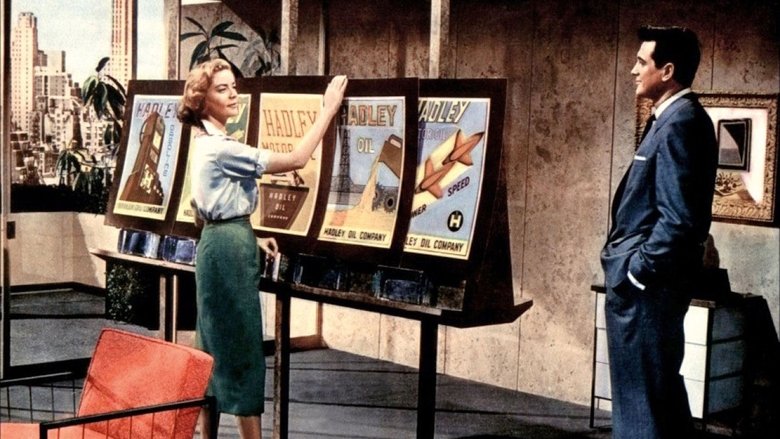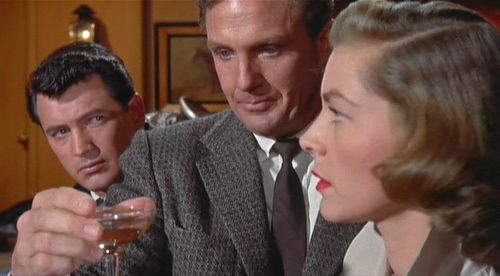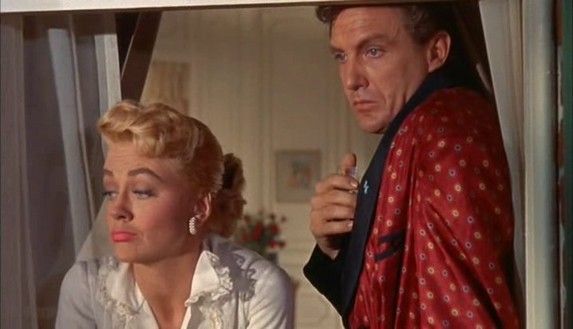← Back to Reviews

in
WRITTEN ON THE WIND
Douglas Sirk, the King of 1950's melodrama, hit another bullseye with 1957's Written on the Wind, a soapy but extremely entertaining film that still works, despite some dated elements.

The film stars Robert Stack as Kyle Hadley, a wealthy alcoholic playboy who instantly falls for a secretary at his father's company (Lauren Bacall), who has also caught the eye of Kyle's best friend Mitch Wayne (Rock Hudson), who is also the lifelong obsession of Kyle's trampy sister, MaryLee (Dorothy Malone).

Based on a novel by Robert Wilder, George Zuckerman's screenplay makes all the moves expected from melodrama in the 1950's...we have best friends torn apart by a woman, a man who thinks he can buy a woman's affections and learning that all the money in the world is ineffective next to a wedding ring and that obsession can drive people to destroying people they care about.

The primary quadrangle that makes up this story is constructed in a way that we know immediately there's no way things aren't going to get messy, but the slow reveal of how the destruction commences keeps us guessing and throws in a couple of curves we didn't see coming that during 1957, probably had some censors squirming, but probably attracted audience in droves as word of mouth spread.

There are some really interesting casting choices made here...Robert Stack probably had the most significant role of his movie career as the self-destructive Kyle and he makes the most of it, forcing Rock Hudson to underplay his role in order to make Stack's performance viable. I have to admit though, that as I watched this film, I couldn't help but think of how different this film might have been if Hudson and Stack had switched roles. Kyle reminded me a lot of Hudson's character in Magnifcient Obsession and I definitely could have seen it, but Stack was surprisingly solid. Lauren Bacall's stylish work brought a richness to her character that really wasn't in the screenplay and Dorothy Malone's delicious scenery chewing in the film's showiest role won her the Oscar for Best Supporting Actress of 1957. Malone's role required her to invest in some things that would be laughed off movie screens today, but in '57 audiences ate it up and so did the Academy.

Director Douglas Sirk proves once again that he understood the melodrama genre and the emotions that it is supposed to produce, giving the intended audience exactly what they wanted. If you like your soap against glamorous Ross Hunter-like-trappings, you will love this.
Douglas Sirk, the King of 1950's melodrama, hit another bullseye with 1957's Written on the Wind, a soapy but extremely entertaining film that still works, despite some dated elements.

The film stars Robert Stack as Kyle Hadley, a wealthy alcoholic playboy who instantly falls for a secretary at his father's company (Lauren Bacall), who has also caught the eye of Kyle's best friend Mitch Wayne (Rock Hudson), who is also the lifelong obsession of Kyle's trampy sister, MaryLee (Dorothy Malone).

Based on a novel by Robert Wilder, George Zuckerman's screenplay makes all the moves expected from melodrama in the 1950's...we have best friends torn apart by a woman, a man who thinks he can buy a woman's affections and learning that all the money in the world is ineffective next to a wedding ring and that obsession can drive people to destroying people they care about.

The primary quadrangle that makes up this story is constructed in a way that we know immediately there's no way things aren't going to get messy, but the slow reveal of how the destruction commences keeps us guessing and throws in a couple of curves we didn't see coming that during 1957, probably had some censors squirming, but probably attracted audience in droves as word of mouth spread.

There are some really interesting casting choices made here...Robert Stack probably had the most significant role of his movie career as the self-destructive Kyle and he makes the most of it, forcing Rock Hudson to underplay his role in order to make Stack's performance viable. I have to admit though, that as I watched this film, I couldn't help but think of how different this film might have been if Hudson and Stack had switched roles. Kyle reminded me a lot of Hudson's character in Magnifcient Obsession and I definitely could have seen it, but Stack was surprisingly solid. Lauren Bacall's stylish work brought a richness to her character that really wasn't in the screenplay and Dorothy Malone's delicious scenery chewing in the film's showiest role won her the Oscar for Best Supporting Actress of 1957. Malone's role required her to invest in some things that would be laughed off movie screens today, but in '57 audiences ate it up and so did the Academy.

Director Douglas Sirk proves once again that he understood the melodrama genre and the emotions that it is supposed to produce, giving the intended audience exactly what they wanted. If you like your soap against glamorous Ross Hunter-like-trappings, you will love this.
